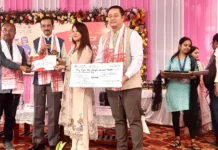ITANAGAR, 9 Aug: “India is one of the largest democracies in the world and it can be a leader when it comes to protecting and promoting the rights of indigenous people,” said Phoolman Chaudhary, Vice Chair to United Nations Permanent Forum on Indigenous Issues (UNPFII).
Chaudhary said that India can even be stronger and will truly shine, if it fully guarantees the rights of the indigenous people by harmonizing the UN Declaration on the Rights of Indigenous Peoples (UNDRIP) into its domestic laws.
“When the citizens of a country are fully protected and respected under the law, the citizens can live their true potential by enjoying their full rights,” he said addressing the International Day of World’s Indigenous Peoples at Don Bosco College, Jullang on Tuesday.
“India has several laws and Constitution provisions, such as the Fifth Schedule for Central India and the Sixth Schedule for certain areas of Northeast India, which recognize indigenous peoples’ right to land and self-governance. The laws aimed at protecting Indigenous peoples have numerous shortcomings and their implementation is far from satisfactory,” Chaudhary said.
He said that the appointment of Droupadi Murmu as the 15th President of India is a clear message to the world that India wants to shine and take the right steps towards protecting and promoting the rights of indigenous people as declared in the UNDRIP.
Chaudhary said that in this contemporary world, the indigenous people are further confronted with challenges in upholding their roles to defend the indigenous land, forest including natural resources, culture and values. There is much to celebrate, including solid human rights standards on which to build inclusive societies in partnership with indigenous peoples.
“We indigenous peoples are greatly affected by poverty, systemic discrimination and exclusion from political, social and economic decision-making. In all regions of the globe, we still witness wide gaps between human rights commitments and realities faced by indigenous people. That is why, the objective of the indigenous leader is to have an action-oriented outcome for realization of the rights of indigenous people at the national and international levels in line with the implementation of the UNDRIP,” he said.
Chaudhary urged all the states to work in full partnership with indigenous people and their representatives to improve their lives and opportunities.
He said that 260 million indigenous people representing 2,000 distinct civilizations and languages live in Asia region.
“They face an array of challenges such as the denial of the right to self-determination, the loss of control over their land and natural resources, discrimination and marginalization. Although UNDRIP enjoys wide support in the region, we have the ILO convention no. 169, but still we are struggling to move further,” Chaudhary said.
He requested the member states of Asia region to explore the ratification of the ILO Convention No.169 because it can facilitate both the identification of indigenous within the meaning of the Convention and also the development of legislative and policy.
“Furthermore, making progress in implementing the 2030 Agenda for Sustainable Development Goals and the Paris Agreement on climate change also requires renewed efforts in addressing the rights of indigenous and tribal people. Hence, we cannot continue to ignore the rights and aspirations of the Indigenous peoples,” Chaudhary added.
The UNPFII is a high-level advisory body to the Economic and Social Council. The Forum was established in 2000 with the mandate to deal with indigenous issues related to economic and social development, culture, the environment, education, health and human rights.
Speaking about this year’s theme “Preservation and transmission of traditional knowledge,” incoming member to UNPFII Dr Hanieh Moghani said: “It is an opportunity to celebrate indigenous women’s rich knowledge about the natural world, health, technologies, distinct rites and rituals, and other significant cultural expressions.”
Moghani said that indigenous women are the backbone of indigenous peoples’communities and play a crucial role in the preservation and transmission of traditional ancestral knowledge.
“They have an integral collective and community role as careers of natural resources and keepers of scientific knowledge. Many indigenous women are also taking the lead in the defense of lands and territories and advocating for indigenous peoples’ collective rights worldwide,” she said.
Moghani also said that indigenous women play a vital role as holders of scientific and technical knowledge related to medicines and foods, conservation and the preservation of language, culture, and generational histories. “Their knowledge is critical in creating solutions to conflict through indigenous justice; in addressing climate change and the preservation and protection of biodiversity; to maintaining indigenous identity and knowledge; achieving sustainable development; and building resilience in the face of pandemics and other extreme events,” Moghani added.

